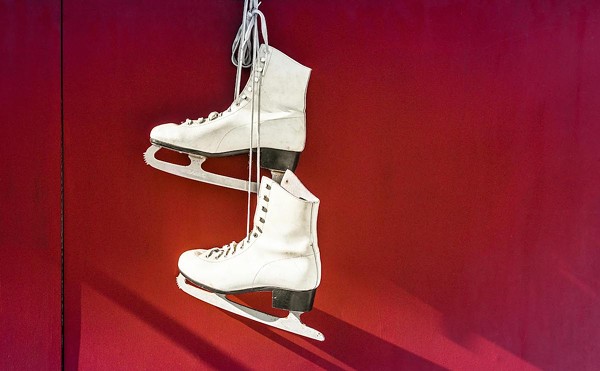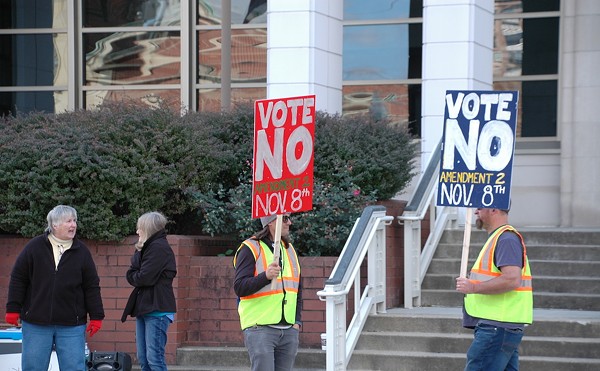|
Dr. Judith Allen holds up a picture of a homeless man with what she calls a "Bart Simpson" lip: The upper lip is so swollen that it sticks out inches from the face farther than the lower lip.
From the man's chin to above his eyebrow, the skin is a sickly yellow. Allen says the man's tooth is severely infected and could spread to the nasal cavities.
"Within hours, he will die," she says.
Fortunately, Allen was able to drain the infection and administer antibiotics. A second photograph shows the patient 24 hours later, brightly smiling and looking fully rejuvenated.
With grants from the U.S. Department of Housing and Urban Development (HUD), Allen has had several such success stories. But she admits a lot of help comes from the free rent and utilities provided by her landlord, Nu-Blend Paints, Inc.
Not just a new veneer
A nonprofit organization located in an old Hudepohl brewery in Over-the-Rhine, Nu-Blend was founded in 1995 in partnership with Keep Cincinnati Beautiful. The purpose of the company is to take people's leftover and unwanted paint and remix it for resale at below retail costs, thus keeping the environment cleaner and providing quality paint for less than half the cost of retail.
"I saw in the paper, 'Wanted: Manager of environmental paint program, 10 hours a week,' " says Bill Wojick, director of Nu-Blend.
"The only part I understood was 10 hours a week.
"They figured if you put an 18-wheeler in a Kroger parking lot, people would bring in their old, unwanted paint," Wojick says. "It failed for two reasons. They didn't know what they were doing with the mixing of the paint. The second was they didn't put any value on the paint. It was like Ford's Model-T: 'You can have any color you want as long as we've got it.' "
Working as collector, blender and distributor with the ailing company four years, Wojick confronted the owners and told them that they had to sell the company.
" 'But it's not profitable,' they said. I told them I know that, but the people who buy it will make it profitable," Wojick says. "They said, 'Who's going to buy it?' I said I would."
After purchasing the company, Wojick got seed money and tried to get grants.
"It was then I realized what it meant to be in the Empowerment Zone," he says, smiling. "I thought I was going to get a check. It turns out I had to spend the money and would be reimbursed. But you can't get reimbursed if you have no money to spend."
So Wojick got more seed money and started receiving funding as an Empowerment Zone company for the next three years.
"We're not a profitable company, but we're a heck of a lot closer than we were before," he says.
Wojick attributes Nu-Blend's growing success to the fact that it doesn't have what he calls "the nonprofit mentality."
"You beg for money and then you spend it," he says. "You beg for more money and then you spend it. Beg. Spend. We're trying to build something that will sustain itself."
Nu-Blend provides four hours of classes on how to be a painter for every eight hours of volunteer work.
"You can work the hours whenever you want," Wojick says. "All we care about is if you're committed. Unions like it because it gives them a boost above a guy who doesn't know what he's doing."
Nu-Blend compiles a list of graduates for independent contractors looking for help.
Making the future smile
Nu-Blend's Clean Paint and Repair Department gives graduates field experience. A third of the painters it sends on jobs are new trainees, a third are independent contractors and the remaining third are the company's own employees, who supervise the job.
"We're an opportunity agency, not a social agency," Wojick says. "We give nothing away. Well, we do but we don't broadcast that."
When graduates want to go into business for themselves, Nu-Blend provides advice and counseling. Those who live in the Empowerment Zone receive a 25 percent discount on paint.
"You can't expect it to happen in two weeks," Wojick says. "They can come back whenever they want, ask questions. We'll teach them all the technicalities and paperwork."
Nu-Blend's vision for the future is its new department, Nu-Build. To kick off this campaign, Nu-Build has collected more than 1,000 "unsellable" interior and exterior doors and sells them to residents for $25 each.
"If anyone in the Empowerment Zone wanted to do some housing work, all they need is $25 to buy a door that they can paint and resell for a profit," Wojick says.
On Dec. 12, Nu-Build gave away thousands of "unsellable" batteries — rejected by retail stores because of incomplete sets or damaged packaging. Residents could take their choice of 30 free batteries while supplies lasted.
Wojick wants to start three more classes for people who want to become carpenters, electricians or plumbers. In the past year the paint class graduated 65 people. Next year's goal is 100.
Allen's dental clinic, in the same building, has four dental assistants and two other employees. The clinic receives free rent and utilities, compliments of Nu-Blend.
"I don't get a nickel from them for anything," Wojick says.
The clinic is funded by a $123,000 grant from Impact 100 for new chairs, oral vacuums and a new X-ray machine, along with a $750,000 grant from HUD three years ago.
The clinic is free to any person who has been declared homeless by an organization such as the Drop-Inn Center or Free Store Food Bank. To help with the huge workload, three volunteer dentists work at the clinic once a month.
Allen has an album filled with "before" and "after" photos of patients. One woman had her front and several other teeth missing.
"She had absolutely no self-confidence when she came in," Allen says. "But now look at her. Several of them go to job interviews with pride. It's unbelievable what a smile can mean." ©





